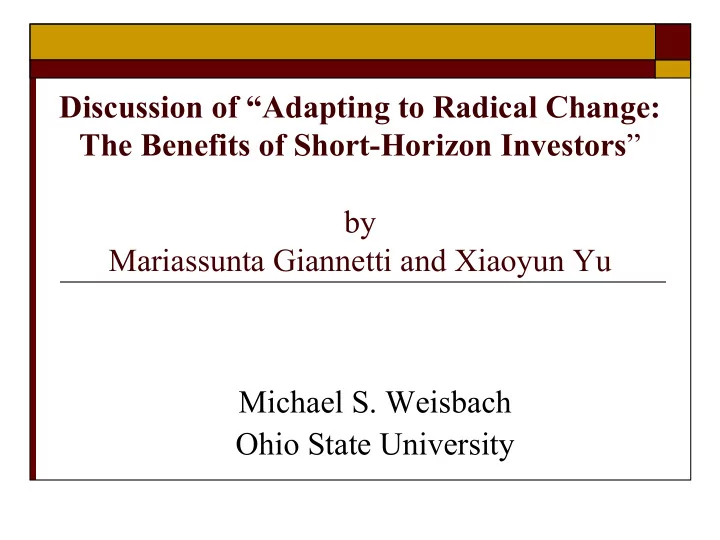

Discussion of “Adapting to Radical Change: The Benefits of Short-Horizon Investors ” by Mariassunta Giannetti and Xiaoyun Yu Michael S. Weisbach Ohio State University
Classic Question in Corporate Finance: Does Ownership Matter? o Usual Answer: Yes! o Usual Logic: More ownership, especially by long- term blockholders, increases value. n Better incentives of managers to increase value n Better incentives of blockholders to monitor o Giannetti-Yu Answer: Yes! o Giannetti-Yu Logic: Short Term Shareholders, because they will sell if they are unhappy, encourage managers to make better decisions. 2
What Giannetti-Yu Paper Does o Considers “shocks” to companies coming through changes in tariffs. o Looks at the way that firms respond to these tariffs. o Finds that firms with more short-term shareholders respond more effectively than firms with longer-term shareholders. 3
My Reaction o This paper turns the literature on its head. o Previously, literature presumed long-term shareholders were more beneficial than short- term shareholders. o This paper argues otherwise, it claims that there can be advantages of short term shareholders as well. 4
Horizon vs. Concentration o This paper focuses on the horizon of investors. o Prior literature focuses on the concentration of investors. o The two are related; blockholders tend to be long-term investors, but not always. o Do the empirics in this paper control enough for concentration? o How about the identity of investors? Are individual investors different from institutional investors? o Theoretically, which should be more important and under what circumstances? 5
Empirical Design Focuses on Firms’ Responses to Negative Shocks o Why is this the right thing to look at? o Plausible that the same logic can work in good times and average times as well. o What happens if you rereun the Morck/Shleifer/Vishny regression using horizon rather than concentration: q = f (ownership) n o More general question: How does the horizon of investors affect investors’ actions, and also the actions of firms’ managers? o Has the literature on ownership and performance been 6 focusing on the wrong thing?
International Considerations o Paper is by a Chinese and an Italian (who works in Sweden) and is being presented in Israel. o Why US data? o Isn’t this a worldwide question? o There are important differences in shareholder horizon and effects on managers across countries. o A good Korean friend just told me that in Korea, without a large, long-term blockholder who owns at least 20%, corporate governance would be hopeless there. 7
Endogeneity o Endogeneity is the profession’s current obsession . o I have argued elsewhere that governance is endogenous in an important way. o But for this paper, it seems a bit overblown; the shareholders in any firm are who they are and it is really important to understand what they do. o I’d rather see authors’ attention focus more on what the results mean, and the extent it is the investors’ horizons rather than something else, that explain their results. 8
Overall o Very provocative idea/results. o How does the horizon of shareholders affect their actions, and managements’ responses? o Paper should spend more time trying to distinguish the effect of investor horizon from their concentration. o Do authors think that short-term shareholders matter when firms receive negative shocks, but long-term shareholders add more value at other times? Paper seems to be written that way. n If authors think this is true, then they should state/develop n 9 the idea more.
Recommend
More recommend